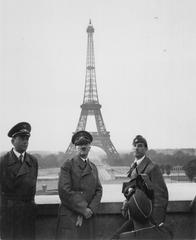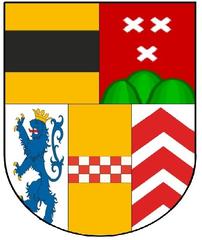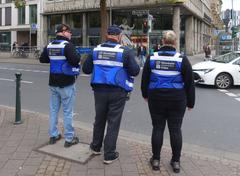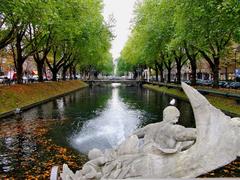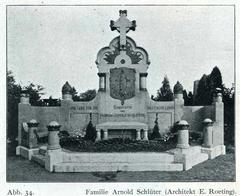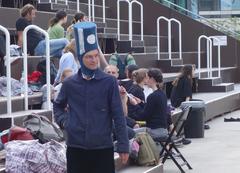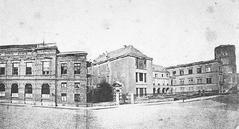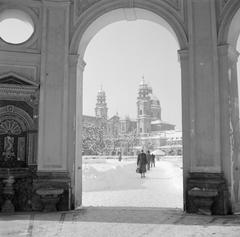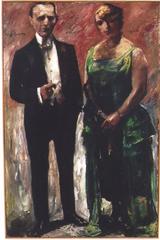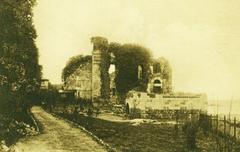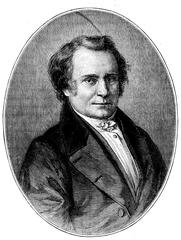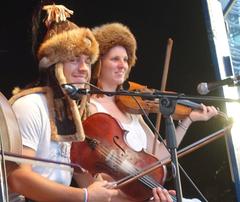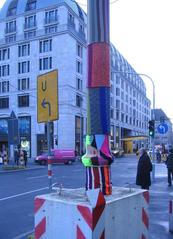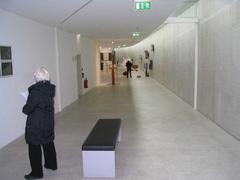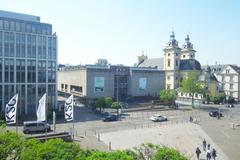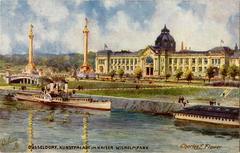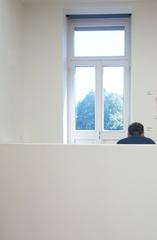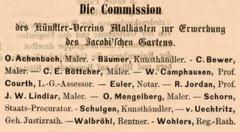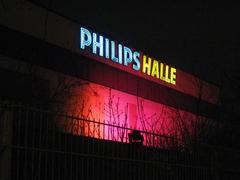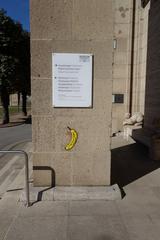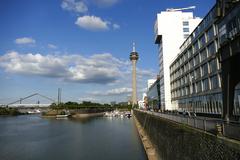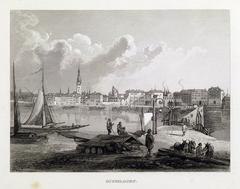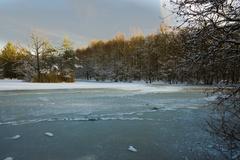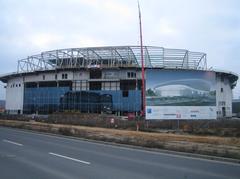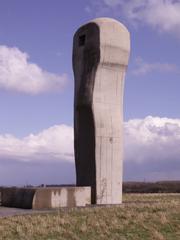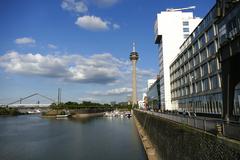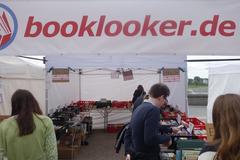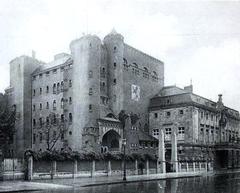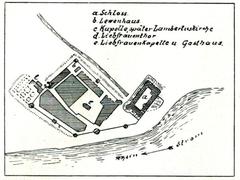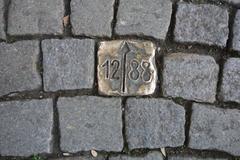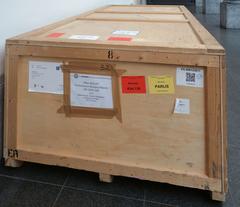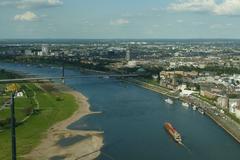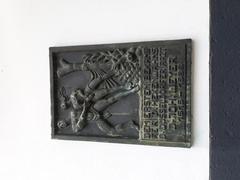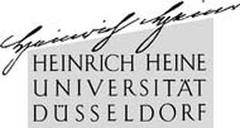
Schloss Jägerhof: Visiting Hours, Tickets, and Düsseldorf Historical Sites Guide
Date: 03/07/2025
Introduction
Schloss Jägerhof is a prime example of late Baroque and Rococo architecture and a central landmark in Düsseldorf’s cultural and intellectual history. Originally conceived as a hunting lodge in the late 17th century, the palace underwent a major transformation in the 18th century under Elector Karl Theodor, who commissioned its reconstruction as a Rococo pleasure palace. Not only does Schloss Jägerhof reflect the changing tastes and urban ambitions of its era, but it also serves today as the home of the Goethe Museum, which houses a significant collection dedicated to Johann Wolfgang von Goethe. This guide provides detailed insights into the palace’s history, architecture, visiting hours, ticketing, accessibility, and nearby attractions, making it an essential resource for anyone exploring Düsseldorf’s historical sites (Wikipedia; Visit Düsseldorf).
Table of Contents
- Historical Development
- Architectural & Urban Significance
- Cultural Legacy and Modern Role
- The Goethe Museum at Schloss Jägerhof
- Visiting Schloss Jägerhof: Practical Information
- Frequently Asked Questions (FAQ)
- Visual & Interactive Elements
- Plan Your Visit
- References
Historical Development
Origins and Early Development
The site’s origins trace back to the late 17th century, when the first “Jägerhof” served as the seat of the electoral forestry administration and a hunting retreat for the elite. The term “Jägerhof” translates as “hunter’s court,” reflecting its early role in wildlife management and courtly sport (Wikipedia).
Baroque Ambitions and Transformation
Under Elector Karl Theodor in the mid-18th century, Schloss Jägerhof was transformed from a functional hunting lodge into a lavish Rococo palace. Construction began in 1752 under architect Johann Joseph Couven and was completed in 1763. The design’s symmetry, ornamental reliefs, and its position at the end of Hofgarten’s main avenue made it a focal point of Düsseldorf’s urban landscape. The palace’s distinctive color scheme and architectural features closely mirror those of Benrath Palace, another project linked to chief building director Nicolas de Pigage (Visit Düsseldorf; Kulturportal Düsseldorf).
From Hunting Lodge to Social Hub
As Düsseldorf expanded, Schloss Jägerhof evolved from a rural hunting retreat into a venue for courtly gatherings, music, and intellectual salons, gradually integrating into the city’s fabric. Its transformation reflected the shift in aristocratic life from rural pursuits to urban sociability and cultural patronage (Visit Düsseldorf).
19th & 20th Century: Turmoil and Restoration
The palace’s fortunes changed during the Napoleonic Wars, suffering damage in 1796 and later serving as a hospital. In 1811, it was restored for a visit from Emperor Napoleon. Prince Friedrich of Prussia’s subsequent residence turned Schloss Jägerhof into a center of Düsseldorf’s social and cultural life. In the 20th century, the palace underwent periods of neglect, was repurposed as a museum in 1955, and finally became the home of the Goethe Museum in 1987 (Goethe Museum; Wikipedia).
Architectural & Urban Significance
Schloss Jägerhof is celebrated for its symmetrical Rococo façade, ornate stonework, and harmonious integration with the Hofgarten. The building’s rose-colored plaster, accented with natural stone and painted wood, exemplifies the playful elegance of Rococo design. Inside, the layout features interconnected salons and galleries, originally adorned with stucco, gilded mirrors, and pastel-colored ceilings (lehmkuhl-lrp.de). The palace’s original gardens, with geometric parterres and water features, reinforced the fusion of architecture and nature, although only remnants survive today (destinations.ai).
Ongoing restoration projects, guided by comprehensive material analysis, ensure the preservation of original features and materials (lehmkuhl-lrp.de).
Cultural Legacy and Modern Role
Schloss Jägerhof’s layered history—spanning hunting lodge, royal residence, hospital, and museum—embodies Düsseldorf’s resilience and cultural evolution. Since 1987, it has housed the Goethe Museum and the Ernst Schneider Foundation, continuing its tradition as a venue for art, scholarship, and public engagement. The palace remains a vital institution, offering exhibitions, literary events, and educational programs that connect past and present (Goethe Museum; Visit Düsseldorf).
The Goethe Museum at Schloss Jägerhof
Foundation and Collection
The Goethe Museum is operated by the Anton-und-Katharina-Kippenberg-Stiftung in collaboration with the City of Düsseldorf. Its foundation is based on Anton Kippenberg’s private collection—approximately 50,000 objects, including 30,000 manuscripts and letters, rare first editions, memorabilia, art, and music from the 18th–19th centuries (goethe-museum.de). The museum offers a deep dive into Goethe’s creative life and the intellectual climate of his time.
Exhibitions and Programming
Permanent exhibitions explore Goethe’s biography, literary legacy, and cultural impact. Special exhibitions and events, often supported by the Ernst Schneider Foundation, connect Goethe’s era with contemporary themes through readings, concerts, and workshops (lokalbuero.com).
Visiting Schloss Jägerhof: Practical Information
Visiting Hours
- Goethe Museum / Schloss Jägerhof: Open Tuesday to Sunday, 10:00 AM – 6:00 PM. Closed Mondays and public holidays. Always check the official website for updates, especially during renovations or special events.
Ticket Prices
- Adults: €6
- Reduced (students, seniors): €4
- Children under 18: Free
- Groups (10+): €4 per person
- DüsseldorfCard holders: Discounts available
Tickets are available at the entrance and online via the Goethe Museum website.
Accessibility
Schloss Jägerhof is barrier-free, with ramps, elevators, and wheelchair-accessible restrooms. Multilingual materials and guided tours in German and English are offered. For special needs, contact the museum in advance (goethe-museum.de).
Guided Tours & Events
- Guided Tours: Offered daily at 11:00 AM and 3:00 PM; advance booking recommended.
- Workshops and Educational Programs: Available for families, schools, and adult groups.
- Events: Regular readings, concerts, and temporary exhibitions. Check the event calendar.
Location & Getting There
- Address: Jacobistraße 2, 40211 Düsseldorf
- Public Transit: Easy access by tram and bus (nearest stops within a 5-minute walk)
- By Car: Limited parking; public transport is advised
- Bicycle: Dedicated bike paths through the Hofgarten (komoot.com)
Nearby Attractions
- Hofgarten: Düsseldorf’s oldest public park
- Düsseldorf Old Town (Altstadt): Historic center with restaurants and bars
- Benrath Palace: Rococo palace with shared architectural lineage
- Kunstpalast Museum: Fine arts collection
- Königsallee: Famous shopping boulevard
- Rheinuferpromenade: Riverside walkways
Frequently Asked Questions (FAQ)
Q: What are the current opening hours?
A: Tuesday to Sunday, 10:00 AM – 6:00 PM. Closed Mondays and holidays. Check the official website for updates.
Q: How much are tickets?
A: €6 adults, €4 reduced, free for children under 18.
Q: Is Schloss Jägerhof accessible?
A: Yes, barrier-free access is provided throughout the museum.
Q: Are guided tours available?
A: Yes, in German and English. Book in advance for groups.
Q: Is photography allowed?
A: Yes, in most public areas. No flash or tripods inside exhibition rooms.
Q: Can I bring pets?
A: Pets are not permitted inside, but leashed pets are allowed in the gardens.
Visual & Interactive Elements
Image suggestions (to be added on publication):
- Schloss Jägerhof façade and Hofgarten (alt: “Schloss Jägerhof Düsseldorf entrance and Hofgarten”)
- Goethe Museum exhibition room (alt: “Goethe Museum manuscripts display”)
- Guided tour group (alt: “Visitors on guided tour at Goethe Museum”)
- Map of Düsseldorf with Schloss Jägerhof highlighted (alt: “Map of Schloss Jägerhof in Düsseldorf”)
Plan Your Visit
Enhance your cultural journey by downloading the Audiala app for expert audio guides, personalized tips, and notifications about events at Schloss Jägerhof and other Düsseldorf attractions. Follow the Goethe Museum and Audiala on social media for the latest updates.
References
- Wikipedia: Schloss Jägerhof
- Visit Düsseldorf: Schloss Jägerhof
- Lehmkuhl LRP: Schloss Jägerhof
- Goethe Museum: Schloss Jägerhof
- Travelsetu: Things to Do in Hofgarten
- Lokalbuero: Goethe Museum Leadership
- Komoot: Schloss Jägerhof Highlight


















